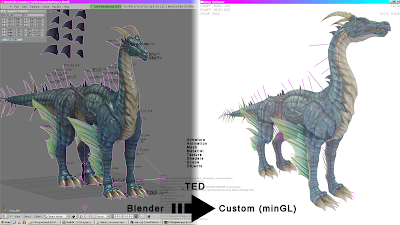Well, I upgraded my model exporter from blender to 2.49b; so now, instead of the annoying variety of formats I used to use (obm, arf, brf arf2.0, brf3.0, grf, iRF) I decided to spec out a more logical, easier to understand but far more byte/size inefficient DXML format.
I call it "TED" (Text Extracted Data).
The goal of TED files is to export the maximum usable, useful information out of Blender 2.49b+.
- This includes Meshes, Armatures, Animations, Objects, Materials, Textures, and some scripting and logic elements. Meshes should contain enough data to be GLSL renderable (IE normals, tangents, uv layers, parameters).
- TED files must also conform to a very strict file standard, so there will be NO allowed coordinate systems other than the default universal correct system (RHR, +X forward, +Y left, +Z up; This is universal for ALL transforms. Matrices also have a standard definition of Xx Xy Xz Yx Yy Yz Zx Zy Zz where X is the forward axis, Y is the left axis, Z is the up axis. Quaternions follow these definitions as well.)
- TED files must be easy to read in; Though they are not (byte) efficient, they should contain "hints" for a loader so it may allocate elements beforehand; for example declaring the number of elements in an array before reading it in. You might notice .TED files can be
- TED files must maintain a logical and render-system friendly data model; And must encapsulate all data elements; No element can have differing types of data; ergo a tag can store an array of strings, an array of ints, an array of floats, or other tags ONLY.
What TED files should NOT be used for:
- Final game data (you should convert to your own or local host format)
- Final Level descriptions (TED files do not provide hashing or optimizations or portals of scenes)
- Replacing something you already understand (unless it has something you need; just make a converter to convert TED to whatever)
I have not made the exporter for 2.5.2 yet because I have been burned many times by blender changing specifications mid-stream on me. Luckily, the ted exporter is written to avoid this as much as possible; but when more alpha versions come out I will snap one in easily. Until then, 2.49b it is.
If I could show you a .TED file I would; but HTML can't understand < > signs.
Have a dragon instead (All credit goes to DragonBlade from the Wii; Obviously I'll never use this model, it just happens to be the first example I picked)

Blender on the left, mingl without GLSL on the right (in-game)
-Z
No comments:
Post a Comment